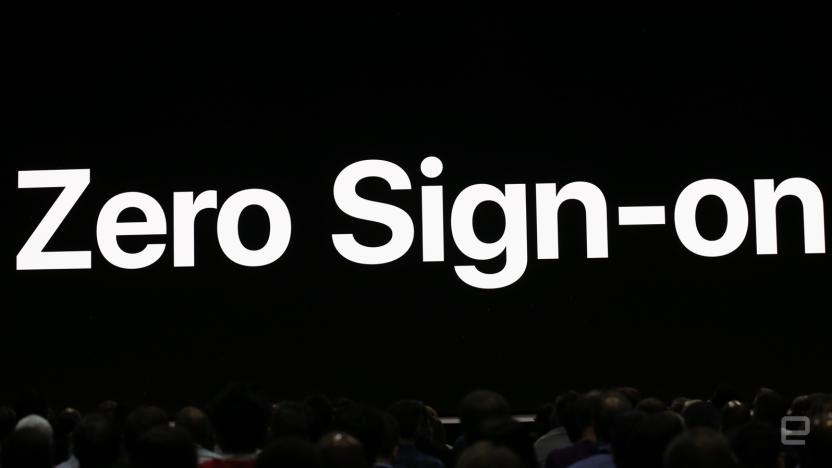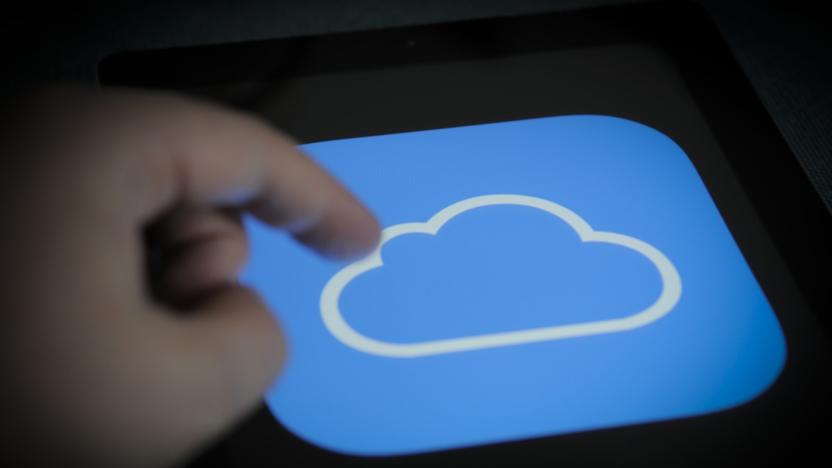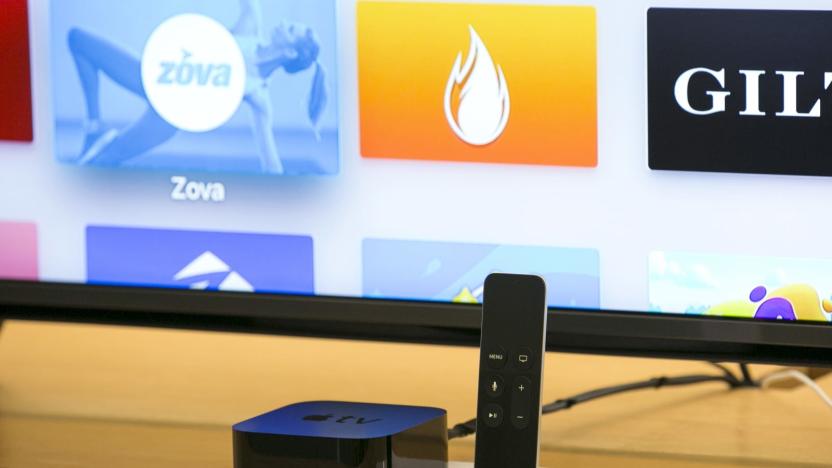singlesign-on
Latest

Apple TV’s zero sign-on ends frustrating pay-TV logins
It was 18 months ago that Apple brought the single sign-on feature to the Apple TV, the idea being you only have to enter your info once, rather than logging into supported apps individually. Today at WWDC, Apple announced a feature that has you doing even less. With "zero sign-on," the apps of pay-TV providers will automatically log you in, as it were, if you happen to be one of their broadband customers, too. Zero sign-on will be switched on later this year with Charter Spectrum (and its Spectrum TV app) as the first supported network, but expect others to follow suit.

Apple's iOS 11.3 may use iCloud as a single sign-on for websites
You might not to log in to your favorite websites one at a time in the near future. The 9to5Mac team has found code in the iOS 11.3 beta hinting at a single sign-on option for the web based on your iCloud account. It's not certain just how it would work, but you would be giving sites permission to access "personal iCloud data" (possibly your name and email address) in return for the convenience. It wouldn't be a password manager, then -- you'd be handing your Apple ID to the sites in question and avoiding much of the login process.

Amazon adds single sign-on across select Fire TV apps
Amazon teased single sign-in across apps when it launched its new 4K Fire TV last September. It's only now, though, that the company is making good on its promise. If you have a login from a cable TV provider that supports SSO authentication (like Dish, DirecTV, AT&T Uverse, Verizon FiOS and Cox Cablevision), you can sign in once and have access to a a ton of TV network apps. The new ability should roll out over the next several hours, according to an Amazon spokesperson.

ESPN brings Apple's handy single sign-on tool to its iOS apps
When it comes to streaming apps that are tied to a cable subscription, having to sign in repeatedly can become a bit of a chore. ESPN has updated its main app and WatchESPN with Apple's single sign-on feature so you only have to enter your cable log-in once and it gets populated across the sport network's software for any device connected to iCloud. While WatchESPN has had the ability to beam the action to your TV with Chromecast for a while now, that main ESPN app also gains the functionality with this new version.

Apple's TV single sign-on feature goes live in the US
Apple just made your TV watching much easier... if you subscribe to the right services, that is. After dropping some hints in November, Apple has activated its promised single sign-on feature for Apple TV and iOS users in the US, but only for a handful of offerings. DirecTV, Dish and cord-cutter service Sling TV are the highlights among providers. Only some channel-specific apps can use SSO as well: A&E, Bravo, NBC, Syfy and USA are among the choices, and the option isn't always available on both Apple TV and iOS gear.

Apple TV gets better for cord-cutters and cable TV subscribers
Today at its big WWDC keynote, Apple announced a few updates for the Apple TV platform. New apps arriving include Sling TV (finally), Fox Sports, the French streaming service Molotov and the Minecraft: Story Mode game. Apple is also upgrading the remote application on your iPhone. The app is a lot more like the hardware remote, with touch-based navigation, Siri voice search, plus the ability to use the keyboard for input and game control using the accelerometer. As for the hardware itself, a new feature called "Live Tune in" will let you switch instantly between livestreaming channels like Disney, ESPN and more. There's also a dark theme now, while Automatic App downloads mean that when you install a universal app on your iPhone or iPad, it will be there on your Apple TV too.

Mozilla drops its single sign-on tech November 30th
Mozilla launched its Persona single sign-on platform to let you easily log in to websites without chaining yourself to a social network or storing passwords locally. However, it never really caught on. As with Thunderbird, Mozilla eventually turned most of the project over to the community. And now, Mozilla is pulling the plug on its remaining involvement. As of November 30th, any sign-ons handled through persona.org will stop working -- if your website uses official Persona sign-ins, you'll have to find an alternative. Mozilla will continue to offer developer support and security fixes until that fateful day, but it's not pouring more effort into it beyond that.

What iOS 7 means for enterprise developers
Apple's latest mobile operating system, iOS 7, is nearing release, and over at VentureBeat, Solstice Mobile CEO J Schwan offered up a guest post positing that iOS 7 is "the most noteworthy iOS upgrade since the iPhone first hit the market in 2007." Schwan is taking the view that "organizations that do not take advantage of iOS 7's new enterprise features will end up serving an outdated app experience to a market of future-hungry end users." Schwan points out that there are significant benefits to quick adoption of iOS 7 for enterprise developers. Enterprise Single Sign-on will both increase security in the enterprise, as well as make it much easier for users to access corporate data assets. AirDrop Sharing for Apps is seen as a way to use real-time document and content sharing for more efficient use of sales, presentation and collaboration tools. Apple's take on Low Energy Bluetooth, known as iBeacon, will enable things like indoor navigation (helping to navigate large buildings or campuses), device presence awareness (what devices / people are in the area right now) and the ability to have location trigger workflow tracking. Schwan sees the "scan to acquire Passbook passes" capability of iOS 7 as a huge potential boon to the company and mobile marketing as well. Apple has over 575 million iTunes customers on file, most of whom link credit cards to those accounts. Should the company be able to integrate mobile payment into Passbook and connect to those credit cards, the sky is the limit for iOS-based mobile commerce. In his post, Schwan also notes that the UI changes in iOS 7 really put content over aesthetics. That gives developers an opportunity, especially in the enterprise, to really make it possible for users to focus on critical tasks instead of navigation. As Schwan concludes, "Enterprises that put the work in now to prepare for the September release of iOS 7 will be ahead of the game."

Apple details iOS 7's improved business credentials
While iOS already has a place in the corporate world, that spot isn't guaranteed when there's competition with both a renewed BlackBerry and Samsung's Knox. Accordingly, Apple isn't leaving anything to chance: it just posted a page explaining the business-friendly iOS 7 features that it teased at WWDC. The biggest improvements for end users may be enterprise single sign-on and per app VPN, both of which will save hassles when launching work apps. IT managers should have it easier as well -- iOS devices can join Mobile Device Management as soon as they're activated, and a company can assign apps to individual users without losing control. There's considerably more features than we can list here, but it's clear from a cursory glimpse that Apple likes its foothold in the enterprise.

Log In with PayPal simplifies shopping, uses your account on merchant sites
There's no shortage of single sign-on solutions out there. But whereas Facebook, Twitter and Google all have a heavy focus on social (obviously), PayPal's take on the field is built around commerce and privacy. Rather than requiring you to set up an account with every site you shop at, entering the same personal information over and over, the stalwart online payment firm wants you to use your PayPal identity across multiple merchants. It uses the same standard protocols (such as OAuth) as its social SSO relatives, but instead of posting meals or books to your feed it sends payment information to shops through a secure channel. When you feel like snagging yourself a pair of fly kicks, all you'd need to do is enter your username and password, or phone number and PIN. All other data, such as shipping and billing address and payment information, would then be passed on by PayPal automatically -- leaving you with nothing to do but admire what a beautiful pair of sneakers your precious Mr. Cuddlesworth makes. For more, check out the quick demo video after the break.






